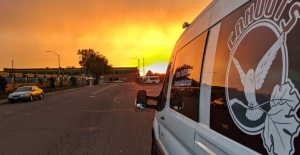A Public Engagement Framework: Reimagining Public Safety in the City of Los Angeles

~Madison Bartula-Henkle, Jenbenton Jean-Baptiste, Patricia Palao Da Costa
Faculty Advisor: Dr. Sabith Khan
The City of Los Angeles (LA) is planning to launch a pilot program in the near future that will largely follow the Crisis Assistance Helping Out On The Streets (CAHOOTS) model.
CAHOOTS was created over thirty years ago in Eugene, Oregon, achieving many accolades within and outside of its originating location. By diverting just 2% (about $2 million) of the local police department’s annual budget (about $90 million), the program has rerouted an average of 20% of the emergency 9-1-1 calls and continues to save the municipal government millions of dollars from legal, medical, and general fees. With the City of LA dealing with a multitude of issues pertaining to law enforcement—including recidivism and mal-placement for people with mental illnesses, high levels of inappropriate incidents of violence, inequitable conditions and treatment for persons of color during law enforcement encounters, and increasing police department malpractice lawsuits—it is an opportune moment for the government to reimagine the response of particular public safety concerns.
To implement the mobile crisis pilot program, we, the student researchers, worked with the City on a project to design a public engagement framework. Using the City’s three goals of informing the public, creating opportunities to voice questions and concerns, and increasing the equity of engagement efforts, we delineated our objectives, designed the framework, and delivered necessary materials for the success of the framework. The four objectives our team had were the following:
- Interview local experts of community engagement, mental health, and/or public safety, for the purpose of retrieving reliable methods of campaigning that will provide both qualitative and quantitative results in five areas:
- Cost-effectiveness
- Inclusivity/Equity
- Practicality
- Effectiveness (in achieving the purpose of the campaign)
- Environmental versatility (remote/in-person/hybrid formats)
- Create materials and infographics for the campaign and pilot program that are easily accessed by all demographics and districts and will be used in social media and in-person efforts.
- Prepare a presentation with pertinent information and frequently asked questions and organize public meetings for individuals and groups to be informed and voice concerns.
- Design two surveys, one for community groups and members to provide feedback after the pilot’s presentations(post-presentation) and another for anyone who uses the pilot’s services after implementations (post-care) for the participating community members in the future campaign and implementation of the pilot, translated in English and Spanish.
To complete the first objective, our team used the Delphi and Action Research methods when finding and interviewing experts in LA. In total, nine experts were interviewed in eight virtual meetings, the qualitative data was coded with twenty-two codes, and the quantitative data was analyzed using descriptive statistics.
With the combination of the literature and unique insights retrieved through interviews of local experts, we recommended to the City of LA that they use a foundation of informing and consulting the public through partnerships. To support this framework and fulfill the other three objectives, our team provided six personalized and dynamic deliverables: a PowerPoint presentation for local partnerships, a PowerPoint presentation for community members, a informational one-pager of our framework design, a combination of infographics, a post-presentation survey in English and Spanish, and a post-care survey in English and Spanish. Using these strategies and materials, we hope for a successful implementation of the framework and future pilot program for the City of LA.
